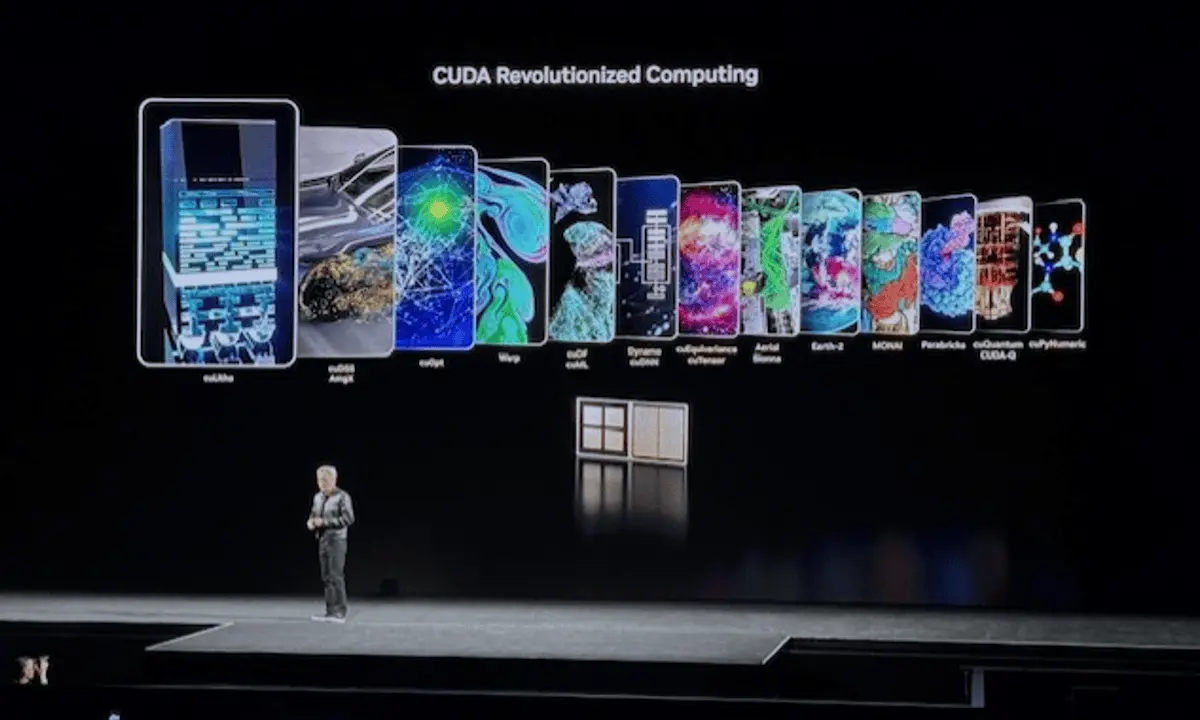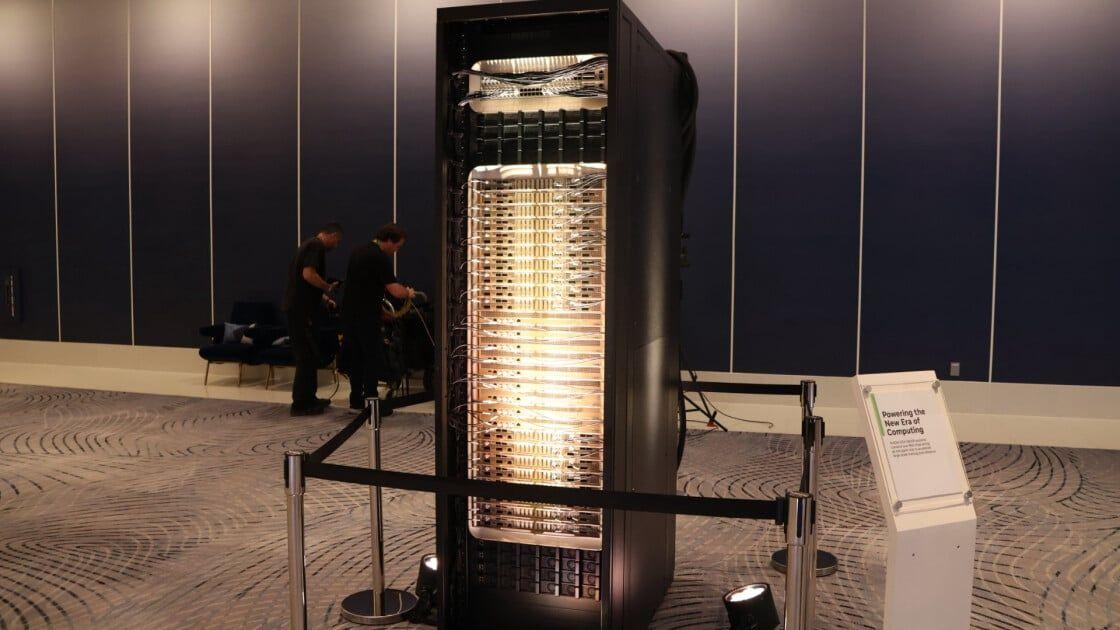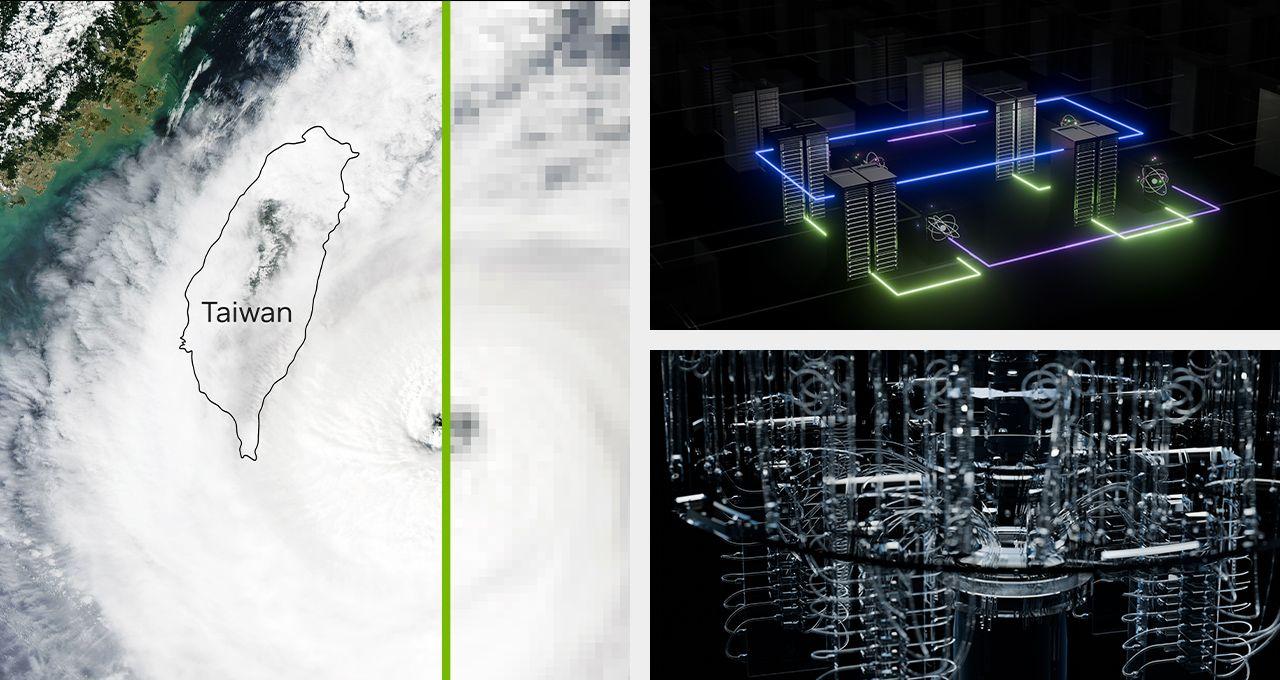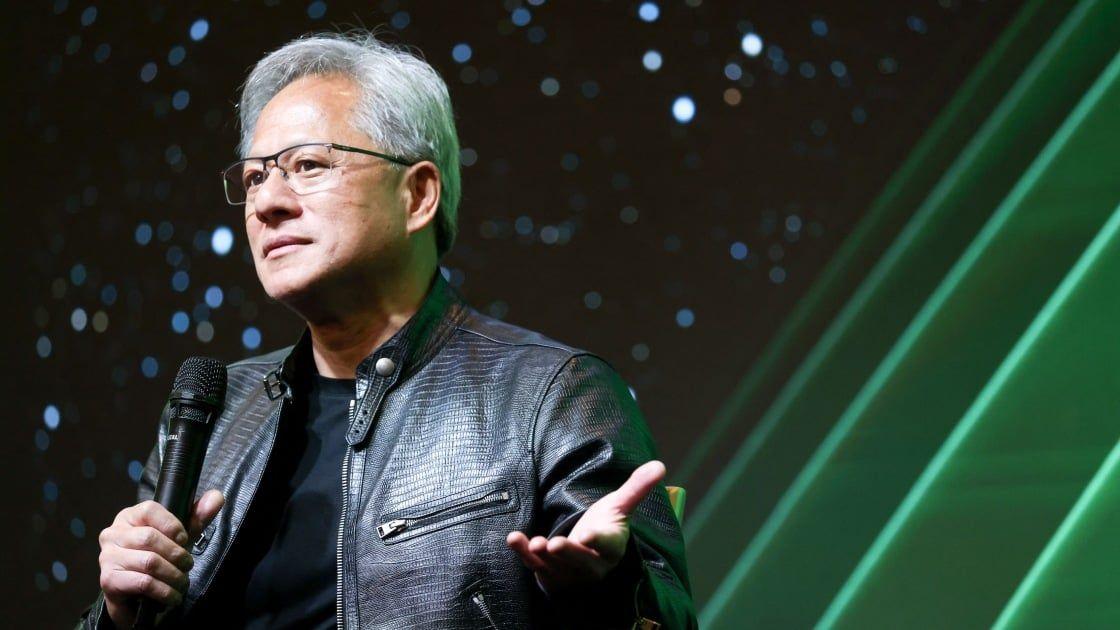Nvidia CEO Jensen Huang Declares Quantum Computing at 'Inflection Point', Unveils New AI Initiatives
3 Sources
3 Sources
[1]
Nvidia CEO says quantum computing is at an inflection point
Jensen Huang made similar comments in March at Nvidia's annual software developer conference when he spoke about the potential of quantum computing, walking back comments he made in January when he said useful quantum computers were 20 years away.Quantum computing technology is at an inflection point, Nvidia CEO Jensen Huang reiterated on Wednesday at the VivaTech conference in Paris. Quantum calculations could crack problems that currently would demand years of processing from Nvidia's most advanced AI systems. Quantum computing will solve "some interesting problems" in the coming years, Huang added. The CEO made similar comments in March at Nvidia's annual software developer conference when he spoke about the potential of quantum computing, walking back comments he made in January when he said useful quantum computers were 20 years away. In March, Huang also announced a new quantum computing research lab in Boston, set to collaborate with Harvard and MIT scientists.
[2]
Nvidia CEO Sees Quantum Computing Reaching 'Inflection Point' | PYMNTS.com
"There's an inflection point happening in quantum computing," Huang said Wednesday (June 11) at the Viva Tech 2025 conference in Paris. "It is clear now we're within reach of being able to apply quantum classical computing in areas that can solve some interesting problems in the coming years." Huang had famously bet Nvidia's future on AI and GPUs about a decade before the technology became a household name. At a keynote speech at Viva Tech, which is France's version of CES, Huang revealed Nvidia is positioning itself to take advantage of the next stop in AI's timeline. Quantum computing is a class of computers that are magnitudes more powerful than today's classical computers. Quantum computers can enable faster processing of AI, which is smart software. Quantum computers use quantum bits (qubits) that can process much more data than classical computers, which store data in bits, or ones and zeroes. Huang expressed a more optimistic view of quantum advancements after comments he made in January tanked some quantum stocks. Back then, he cast doubt on whether useful quantum computers could come online in the next 15 years, according to CNBC. Huang later said he was wrong. At Viva Tech, Huang unveiled CUDA-Q, a new extension of its CUDA platform designed for quantum-classical hybrid computing. CUDA-Q is an open-source hybrid computing platform that lets the hardware and software needed to run quantum computing applications work together. "For at least the next generation of supercomputers, every single one of them will have a QPU (quantum processing unit) assigned and QPU connected to GPUs," Huang predicted, describing a future where quantum and classical architectures work together to solve problems once thought unsolvable. Huang said that just as Moore's Law once predicted exponential growth in classical computing, quantum computing is now poised for a similar trajectory. "I can totally expect 10 times more logical qubits every five years, 100 times more logical qubits every 10 years," Huang said, citing advances in error correction, robustness and scalability that are now within reach. Beyond quantum, Huang also unveiled Nvidia's next-generation Grace Blackwell platform, which Huang described as a "thinking machine" architected for reasoning and planning. This hardware leap enables the creation and operation of digital twins -- digital replicas of physical systems that can be designed and tested virtually before being deployed in the real world. "Because of the scale and the speed by which we can now simulate almost everything, we can turn everything into a digital twin," Huang said. "Everything physical will be built visually." But these AI capabilities need a new type of data center. Huang calls them AI factories. While they may look like traditional data centers, they are not places to merely store and retrieve files. Instead, AI factories process and generate smart tokens (such as groups of words and other data) for AI applications, Huang said, just as car factories manufacture vehicles. "Every country, every society, every company will depend on" intelligence infrastructure, Huang said. "Europe has now awakened to the importance of these AI factories, the importance of the AI infrastructure." Read more: Quantum Leap: 3 Key Developments Chart Path to Real-World Applications Huang traced AI's evolution from perception (computer vision and recognition) to generative AI (multimodal models capable of producing images, text and other data forms), and now to agentic AI. He defined this new paradigm as intelligence that can perceive, reason, plan, and execute tasks -- mirroring the steps of human thought and action. Agentic models enable systems to break down complex problems, research solutions, use tools and act step by step -- moving far beyond simple pattern recognition prevalent in one-step generative AI such as prompting ChatGPT and getting a response. Moreover, agentic AI is not limited to the digital realm, according to Huang. It can be embedded in robots to make them act more intelligently and with context in the physical world. "The fundamental technology to enable agents, which are basically information robots and embodied AI physical robots, ... are now upon us," Huang said. This vision is underpinned by Nvidia's Omniverse platform, which provides a simulation environment for developing, training and deploying both virtual and physical agents. Digital twins powered by Omniverse are being used to simulate factories, warehouses, rail stations, and even fusion reactors before they're built to increase efficiency and reduce risk. It is being used by companies such as Mercedes Benz and BMW. Huang also announced that Nvidia is partnering with Schneider Electric and French startup Mistral AI to build large-scale AI clouds optimized for open and proprietary models. These clouds are intended to enable both foundational model training and enterprise-grade agentic AI applications. Nvidia's industrial AI cloud, launching in Europe, will support real-time design and simulation, from wind tunnels to humanoid robot motion training. Huang described this as the fourth industrial revolution -- following steam, electricity, and information -- anchored by the convergence of simulation, robotics and generative AI. With robotics becoming smarter and more customized, Huang sees a day when even mom-and-pop stores and small to medium-sized businesses (SMBs) will have their own robots. These robots will be teachable, reusable, and deployable in industries that could never afford automation before, Huang said. "It was impossible to have that programming capability -- until now." See also: Nvidia CEO: Why the Next Stage of AI Needs A Lot More Computing Power Read more: Nvidia Launches GPU Marketplace to Broaden Access to Its Chips
[3]
Nvidia CEO says quantum computing is at an inflection point
PARIS (Reuters) -Quantum computing technology is at an inflection point, Nvidia CEO Jensen Huang reiterated on Wednesday at the VivaTech conference in Paris. Quantum calculations could crack problems that currently would demand years of processing from Nvidia's most advanced AI systems. Quantum computing will solve "some interesting problems" in the coming years, Huang added. The CEO made similar comments in March at Nvidia's annual software developer conference when he spoke about the potential of quantum computing, walking back comments he made in January when he said useful quantum computers were 20 years away. In March, Huang also announced a new quantum computing research lab in Boston, set to collaborate with Harvard and MIT scientists. (Reporting by Supantha Mukherjee in Paris Writing by Nathan Vifflin in AmsterdamEditing by Mark Potter)
Share
Share
Copy Link
Nvidia CEO Jensen Huang announces that quantum computing has reached an inflection point, reversing his earlier skepticism. He also introduces new AI and quantum computing initiatives at the VivaTech 2025 conference in Paris.
Nvidia CEO Declares Quantum Computing at Inflection Point
Jensen Huang, CEO of Nvidia, has made a significant shift in his stance on quantum computing, declaring it to be at an "inflection point" during the VivaTech 2025 conference in Paris. This statement marks a reversal from his earlier skepticism expressed in January when he suggested that useful quantum computers were two decades away
1
2
.
Source: ET
Quantum Computing Advancements
Huang's optimism stems from recent progress in the field, predicting that quantum computing will solve "some interesting problems" in the coming years. He envisions a future where quantum processing units (QPUs) will be integrated with GPUs in the next generation of supercomputers
2
.The Nvidia CEO boldly forecasted the growth of quantum computing capabilities:
"I can totally expect 10 times more logical qubits every five years, 100 times more logical qubits every 10 years," Huang stated, citing advancements in error correction, robustness, and scalability
2
.Nvidia's Quantum Initiatives
To capitalize on this quantum revolution, Nvidia has announced several initiatives:
- CUDA-Q: An open-source hybrid computing platform designed for quantum-classical hybrid computing
2
.

Source: PYMNTS
- A new quantum computing research lab in Boston, collaborating with Harvard and MIT scientists
1
3
.
These moves position Nvidia at the forefront of the emerging quantum-classical computing paradigm.
AI Advancements and 'AI Factories'
Alongside quantum computing, Huang unveiled Nvidia's next-generation Grace Blackwell platform, described as a "thinking machine" for reasoning and planning. This hardware leap enables the creation of digital twins - virtual replicas of physical systems for design and testing
2
.Huang introduced the concept of 'AI factories', a new type of data center dedicated to processing and generating smart tokens for AI applications. He emphasized the critical role of these facilities:
"Every country, every society, every company will depend on" intelligence infrastructure, Huang asserted
2
.The Rise of Agentic AI
Huang outlined the evolution of AI from perception to generative AI, and now to agentic AI. This new paradigm involves intelligence that can perceive, reason, plan, and execute tasks, mirroring human thought and action processes
2
.Agentic AI is not confined to the digital realm; it can be embedded in robots to enhance their intelligence and contextual understanding in the physical world. Nvidia's Omniverse platform provides a simulation environment for developing and deploying both virtual and physical agents
2
.Related Stories
Industrial Applications and Partnerships
Nvidia is partnering with Schneider Electric and French startup Mistral AI to build large-scale AI clouds optimized for various models. These clouds will support both foundational model training and enterprise-grade agentic AI applications
2
.The company is also launching an industrial AI cloud in Europe, supporting real-time design and simulation across various sectors. Huang described this as the fourth industrial revolution, driven by the convergence of simulation, robotics, and generative AI
2
.Democratizing Robotics
Looking ahead, Huang envisions a future where even small businesses can afford and utilize custom robots. These robots will be teachable, reusable, and deployable in industries previously unable to afford automation
2
.As Nvidia continues to push the boundaries of both quantum and classical computing, the company is positioning itself at the forefront of the next technological revolution, promising transformative changes across multiple industries.
References
Summarized by
Navi
[3]
Related Stories
Nvidia Launches Accelerated Quantum Research Center to Advance AI-Quantum Integration
19 Mar 2025•Technology

Taiwan's New AI Supercomputer to Boost Research in Quantum Computing and Climate Science
19 May 2025•Technology

Nvidia and Google Quantum AI Collaborate to Accelerate Quantum Computing Development
19 Nov 2024•Technology

Recent Highlights
1
ByteDance Faces Hollywood Backlash After Seedance 2.0 Creates Unauthorized Celebrity Deepfakes
Technology

2
Microsoft AI chief predicts artificial intelligence will automate most white-collar jobs in 18 months
Business and Economy

3
Google reports state-sponsored hackers exploit Gemini AI across all stages of cyberattacks
Technology





